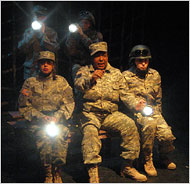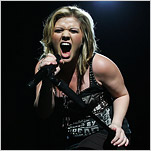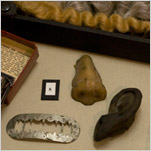If war-story fatigue prevents some theatergoers from checking out “The Lonely Soldier Monologues (Women at War in Iraq),” that will be unfortunate, because this energetically acted example of journalism as theater explores some issues that deserve more attention. Plays and films have parsed the war in Iraq from all sorts of angles — the justifications for American involvement, the treatment of wounded soldiers, the tactical mistakes — but comparatively little has been heard about the increased role of women in the military operations.
Helen Benedict, a journalism professor at Columbia, has interviewed an assortment of female veterans and constructed “The Lonely Soldier Monologues” from their words. If that sounds dry, it isn’t: William Electric Black, her director, has injected the production with plenty of theatricality, using the whole space at Theater for the New City and livening things up with percussion, chanting, even a little audience involvement.
Ms. Benedict, who has also written a book based on her interviews, makes some choices that are less than illuminating. No one wants to hear soldiers whining about rough conditions. (Your tent’s crowded? It’s a war; what did you expect?) And some of what these women complain about has nothing to do with sexism or even the military. (“My team leader was controlling and arrogant,” one grouses. Yeah? You just described 75 percent of the bosses in any hierarchy.)
But the bulk of the dialogue is revelatory and disturbing. Sexual harassment and assault by fellow soldiers is a constant theme. Lack of respect is another, and isolation yet another, women still being a small minority of the military population.
But commendably, the play doesn’t merely ask for equal treatment; it also nods to the particular emotional pressures felt by women in the combat zone, many involving the Iraqi children who would approach soldiers or their convoys.
“You’re supposed to run over them,” one soldier laments. “I was a day-care teacher.”
By the end of the play, you are keenly aware of the desensitizing that female soldiers had to go through to survive in such an environment. It feels like the opposite of progress.
The cast, asked to do a lot with basically a string of anecdotes, is sharp and forceful, especially Kim Weston-Moran and Verna Hampton as the two oldest soldiers, and Macah Coates as a young recruit from Wisconsin. Mr. Black gets carried away with his directorial embellishments at the end, just at the point when understatement would have been more powerful.
But this play is a well-conceived learning experience nonetheless. A panel after Saturday’s performance is to include some of the actual soldiers depicted.


















